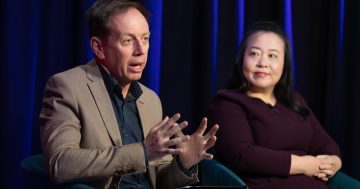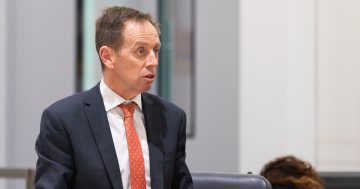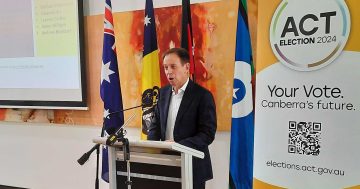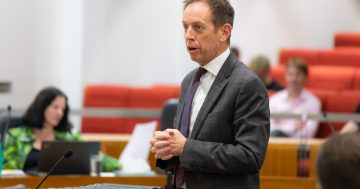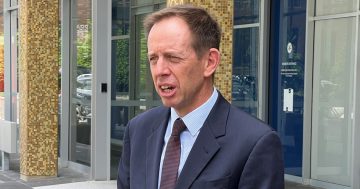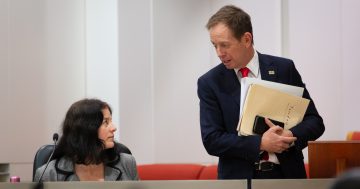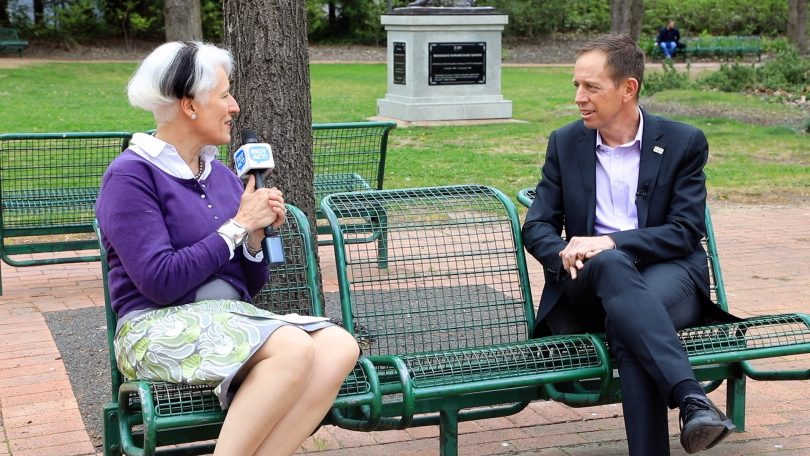
Greens leader Shane Rattenbury believes power-sharing has delivered value for Canberra. Photo: Michelle Kroll.
Greens leader Shane Rattenbury knows he’s in a unique political position: his party will never win government in their own right, but the Hare Clark system has nevertheless delivered them a remarkable measure of power in Canberra for more than a decade.
Unless the Liberals can win 13 seats, that’s likely to continue. Mr Rattenbury’s own seat is safe, and based on the strong Greens result at the last Federal election, voters will at least replace Caroline Le Couteur in the Assembly.
They believe they may even pick up a third seat, approaching the 2008 results that put four Greens in the Assembly.
ACT Election: ACT Greens Leader Shane Rattenbury outlines his vision for Canberra
Greens leader Shane Rattenbury says their ACT election focus is on pragmatism and values. He talks to Genevieve Jacobs about partnerships, delivering power to a development friendly government and deliberative democracy.
Posted by The RiotACT on Thursday, September 24, 2020
But the price of their disproportionate influence on the course of affairs in the ACT is delivering power to a development-friendly Labor government.
Mr Rattenbury says that after 12 years he’s comfortable with that situation, believing that the power-sharing arrangement between Labor and the Greens has largely been value-driven and to the benefit of the community.
“We have never had to do anything with which we are deeply uncomfortable,” he says. “There are certainly issues where if it had been a Green government, the outcome would have been different.
“We don’t always get what we want, but that is part of being in a power-sharing arrangement. We bring ideas to the table. Sometimes we get them through, sometimes we don’t and sometimes we stymie things that other parties want because we don’t think they’re right for the community.”
Mr Rattenbury himself is largely seen as a pragmatic figure: witness, for example, the recent decision by the Greens to back managed, low-level development on West Basin.
Over the term of the power-sharing agreement, his party has pushed through policies like a nation-leading pill testing trial, the drug and alcohol court and the ACT’s net-zero emissions goal.
But they’ve also overseen mushrooming urban growth that risks pushing Canberra’s most vulnerable people to the outer suburbs, and significantly diminished trust in the planning process.
ACT Election Round-Up
Trust is a serious issue. While we wait for the outcome of the current Planning Review, the Greens’ best shot at combating the problem is a proposal to introduce deliberative democracy processes across the ACT.
“The proposition is to engage neighbourhoods in decision making, help them come to decisions about their own communities and put some real money behind it,” Mr Rattenbury says.
“The community at the end of it could allocate where their money would actually go. That makes the deliberative democracy process much more real and concrete for them.
“It will build community connection and help people to see that there are choices to make, whether they want a park upgrade, a party at the shops or better lighting.”
The other critical issue for the Greens and their proportional influence is how far that radiates outside the ‘lentil belt’ of the inner North. Are their priorities for the Inner North also a good match for voters in Tuggeranong or Gungahlin?
Mr Rattenbury concedes there’s no doubt that the Inner North is their stronghold.
“The job for us is to take our policies and ideas and explain to people why they are relevant, like this neighbourhood democracy policy or electric vehicles, where we want people in outer areas to know that they will save 80 per cent of their running costs if they have an electric vehicle. That’s a real way to tackle some of their cost of living issues.”
So for all this talk of compromise and pragmatism, is Mr Rattenbury, with multiple ministerial portfolios under his belt, the acceptable face of the Greens? He won’t be drawn on whether there are more extremist views inside the party, saying that’s for others to judge.
“We have had a role where we’ve had the balance of power and that does bring a responsibility to us that we have to own. We have to take that on board. People want to see us to get on and be part of the process of government, not to sit at the edges sniping. We need to be constructive and we’ve embraced that role,” he says.
“I think that creative tension on government has been pretty healthy. I think it’s been better on the whole than having a single party with a majority.”












